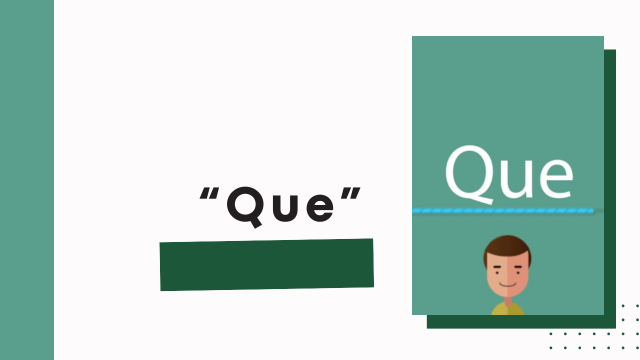Elaborating on the Different Scenarios of “Que”
Que holds great power even when used only as a single word; this is apparent in the diverse languages where it has more than one application and meaning within more cultural and contextual complexities. In whatever capacity, “Que” is a term that functions as a conjunction, as a question word, or even as a definite identifier for that which “Que” is rich with in versatility and importance. We go ahead to discuss the history of “Que” and its cultural relevance from places of use.
1. Linguistic Roots and Their Significance
“Que” occurs in multiple languages, most notably in the Romance languages: Spanish, Portuguese, and French. Its meaning and usage, however, depend on the language of reference.
What is that?) “Sé que estás aquí.” (I know that you are here.) “La casa que compré es hermosa.” (The house that I bought is beautiful.) Portuguese: Like its counterpart in Spanish, “Que” in Portuguese means “that,” “what,” and “which.” Its use is almost the same as Spanish, two languages having almost identical linguistic roots. French: In French, “Que” is a relative pronoun or a conjunction mostly used as meaning “that” or “what.” For example: “Que voulez-vous?” (What do you want?) “Je sais que tu viens.” (I know that you are coming.)
2.Que in Popular Culture and Music
The term Que has made it into popular culture as it concerns music and film: Songs: Que is used often in the names and lyrics of songs, particularly those in Spanish and Portuguese-speaking countries, such as: “¿Qué Será Será?” (What Will Be, Will Be) – A classic about the whim of life.
3. Que as Question Word Que,
or What, is such a word that introduces a question in languages like Spanish and Portuguese. This makes it a necessary part in any form of conversation. For example: Spanish: “¿Qué quieres?” (What do you want?) Portuguese: “O que é isso?” (What is this?) In this very form, it performs the role of question-word importance-revealing correspondence along with its function in curiosity, information-seeking, and the facilitation of conversation.
4.Cultural and Philosophical Implications
In several contexts, “Que” transcends its grammatical implications to denote even more profound cultural or philosophical concepts: Identity and Expression. In French “Je suis ce que je suis” reveals themes of identity and self-acceptance. Cultural Reflection. In Spanish and Portuguese-speaking cultures, ‘que’ appears frequently in proverbs and sayings, witnessed by collective wisdom and values. For example: Spanish: “Más vale tardar que nunca.” (Better late than never.) Portuguese: “Quem tem boca vai a Roma.” (Meaning: Those who has a mouth go to Rome; who asks, finds.)
5.In Computing and Technology
New meanings of “Que” in the digital age: Queue: In the usage of English speaking technological contexts, “Que” is pronounced as “queue” which is referred to in a line or sequence of tasks awaiting execution such as in computer programming or it can refer to streaming platforms. Query: In computer programming and database management, “Que” can also be abbreviated as “query”. That is, a request of information from a system.
6. “Que” as a Symbol of Inclusivity
In the contemporary discourse, “Que” is referred to within space of queer identities in the LGBTQ+ community. It is offered as an inclusive abbreviation or otherwise part of longer terms such as those used for “Queer Studies” reflecting the importance of diversity, representation, and agency in the broader contemporary society.
Conclusion
“Que” embodies an incredibly versatile and culturally rich word found in languages, music, philosophy, and even technology. The adaptation it makes in context proves the beauty of languages and the interlinks that they able to afford between people of different cultures or within different ideas. Whether as a mere conjunction in a sentence, a deep question, or a cultural touchstone, “Que” reminds us of the wealth and complexity in communication and the humanity common to all our words.
ALSO READ THIS: Many Meanings of Cha : Culture and Globe Towards Understanding
Many Meanings of Cha : Culture and Globe Towards Understanding

